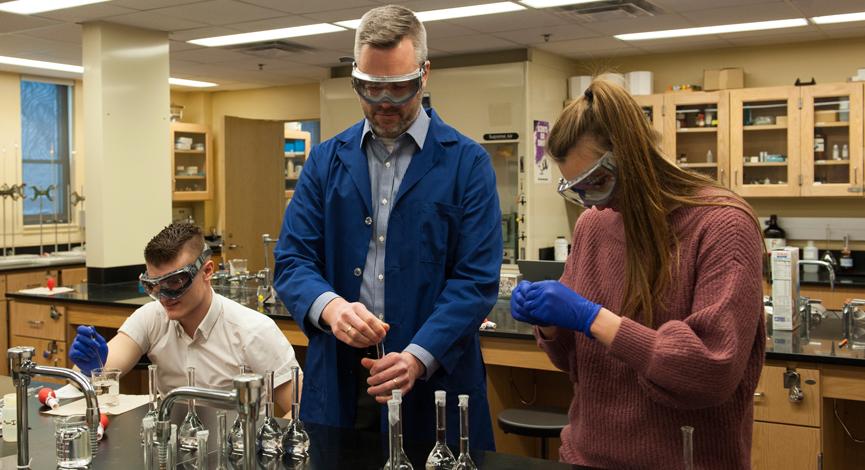
Competitive athletes at all levels – and even those who are in it for personal health – are driven by the Olympic motto Citius, Altius, Fortius – faster, higher stronger. The big question is how do they get there?
Chemistry professor Dr. Aaron Roerdink – an admitted sports nut, especially during the Olympics – is helping students think critically about this issue for his Honors class, Chemistry in Sports. The class is a mix of athletes and non-athletes who are exploring chemistry’s role in the ways athletes improve – even alter – their performance. For example: How are the materials used to make swimmers’ suits making them faster? Or, what is the effect of drinking a caffeinated beverage before a run?
“As scientists, the students ask the question, ‘What constitutes performance enhancement to an athletic achievement or the athletic process,’” Roerdink said. In the class, they are learning about the biochemistry of legal substances such as caffeine and protein/nutritional supplements as well as the use of new technologies that could enhance performance.
They’re also examining a larger, controversial and ethical issue: the use of illegal substances such as steroids and human growth hormones, how they improve performance and affect the body.
For many, including Roerdink, it boils down to a moral question: Is it worth it to achieve something if you’ve cheated to get there?
“With performance-enhancing drugs, for example, where do we draw the line of what’s allowed and what’s not allowed, especially when the assumption that the only way to reach the pinnacle of your sport is through PEDs?” Roerdink asked.
The class is looking at these issues through a variety of eras in sports history from the first modern Olympic Games in 1896 to the Winter Olympic Games taking place this month in PyeongChang, South Korea.
“There are times when (illegal performance enhancement) has creeped into the Olympics,” Roerdink said, citing the current ban handed down in December to Russian athletes accused of doping. Athletes with no previous drug violations were allowed to compete under the neutral “Olympic Athlete from Russia” flag.
The class also will study Major League Baseball’s steroid era and examine the East German sports machine of the 1970s, among other timely topics.
“I really wanted to share my passion for unique sporting events where we see the spotlight on the people who represent us, their passion, even the political bent to it, and figure out how chemistry comes into it,” Roerdink said. “The ultimate goal of the course is a better appreciation of doing sports for the sport of it.”